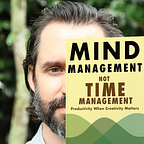Working, Fast & Slow
To have the best output as a knowledge worker, you need to work both fast and slow.
There’s the fast work, the stuff you already know how to do. Then, there’s the slow work, the stuff you need to learn along the way to stay relevant. You don’t know how to do this stuff, and probably nobody else does, because you’re facing a unique challenge that hasn’t existed before.
If you were making widgets, you’d just have to work fast. You’d have to make as many widgets as possible per hour. But you’re not making widgets. You might have years of fruitless exploration, only to have a moment of insight that sets you on the path to success.
But that great idea is worthless if you can’t execute it. You have to do quickly all of the things that you learned, one at a time, slowly. Those late nights you spent in coding tutorial books, or those weekend hackathons where you tried to persuade your teammates to use your idea — those things can finally pay off. You can work fast on those things, because you’ve been there before.
It’s easy to forget how many things — things that you learned slowly — you have to do fast. The expectations of many entrepreneurs today are equivalent to thinking they can pick up a basketball for the first time today, and play like Michael Jordan next week.
The overnight success you heard about was not an overnight success. There were years of learning and struggle and rejection behind it. Yes, maybe the company grew fast, but the people behind it each used things they had learned very slowly. It was a good thing they could do those things fast, because there were a ton of other things they had to learn on the fly — but still slowly.
You can feel the difference between working fast and slow if you pay attention. You know when you’re thinking about a problem, and you actually have to sit down from your standing desk to really process it? That’s working slow. Your brain needs all of its resources to do it.
Then there’s that stuff that you can do while listening to a podcast, or in a noisy cafe where the barista has played Pink’s We Can Learn to Love Again 47 times in a row. That’s working fast. You already know how to do it.
Slow work takes everything you’ve got, and you can only do so much of it. You have to manage your mind so that you get the most learning during that slow work time — so you can later do that work in your fast work time.
So take care of your slow work. Build the habit of doing it every day, block off the time, and save your fast work for a time that fits your brain.
